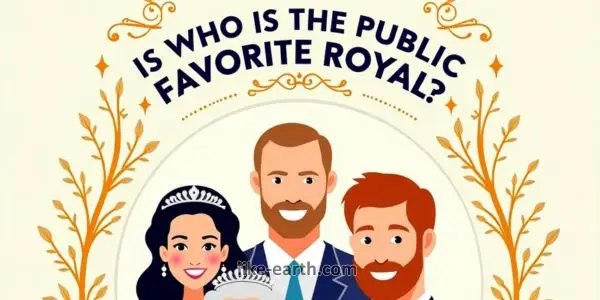Poll: Who Is the Public’s Favorite Royal?

Introduction: Poll Favorite Royal Family Member
Poll: Who Is the Public’s Favorite Royal? – In a world where tradition meets celebrity culture, polling favorite royal family member rankings has become more than just fun speculation. The phrase poll favorite royal family member today reflects a deeper social interest in monarchy, identity, and modern values. Across media outlets and digital platforms, the public voices their admiration—or disapproval—loud and clear. So who stands out?
Royal Popularity: More Than a Popularity Contest
Public opinion polls often mirror the shifting perception of monarchy itself. A favorite royal is often not just charming but also seen as relatable, modern, and authentic. These factors now matter more than birthright. Polling data frequently reflects cultural shifts, political sentiment, and generational divides.
Royal family popularity polls serve as informal barometers of trust and relevance. From Queen Elizabeth II’s decades-long reign to newer figures like Princess Charlotte, every royal name carries weight in these surveys.
Prince William: A Consistent Favorite
In most recent polls, Prince William consistently emerges as the top choice. The heir to the throne is seen as stable, compassionate, and engaged in real-world issues like mental health and homelessness. His visibility and demeanor have earned public admiration.
Survey responses describe him as “responsible,” “grounded,” and “genuine.” His royal duties are balanced with a relatable image, making him a strong favorite among both older and younger demographics.
Kate Middleton: Modern Yet Traditional
The Princess of Wales ranks close to her husband in nearly every poll. Kate Middleton embodies a blend of elegance and approachability. Her work in early childhood development and mental health has boosted her reputation.
Voters often mention her poise and fashion sense, but it’s her consistency that earns her long-term respect. She rarely courts controversy and maintains a family-focused public image.
Queen Elizabeth II: An Enduring Legacy
Though no longer living, Queen Elizabeth II still receives high marks in retrospective polling. Her 70-year reign left an indelible mark on history. She is remembered as dutiful, diplomatic, and graceful during turbulent times.
For many, she remains the standard by which other royals are judged. Her approval ratings often top charts even posthumously.
Prince Harry and Meghan Markle: A Divisive Duo
No discussion of modern royal polling is complete without Prince Harry and Meghan Markle. The couple’s departure from royal duties polarized opinion. Supporters see them as progressive and independent. Critics accuse them of being disloyal and attention-seeking.
Polls show they are more popular in the U.S. than in the U.K. Approval ratings vary significantly by age and region. Younger audiences tend to support them more.
King Charles III: A Work in Progress
Following Queen Elizabeth’s passing, King Charles III stepped into a role long in waiting. Public polling shows mixed feelings. While he receives credit for his climate activism, some view him as distant and less charismatic.
His popularity has grown steadily, though he still trails behind his son and daughter-in-law. Public opinion continues to evolve with his reign.
Younger Royals on the Rise
Surprisingly, young royals like Princess Charlotte and Prince George are already generating polling interest. While still children, their visibility during official events has sparked curiosity and affection among royal watchers.
Many polls feature speculative favorites for future generations, with Charlotte being noted for her “confidence” and resemblance to the Queen.
Poll Methodology: How the Data Is Collected
Most polls are conducted online through reputable platforms like YouGov, Ipsos, or local media. Respondents rate each royal on various attributes like trust, likability, and impact. These are then aggregated into favorability scores.
Some surveys allow open-ended responses, giving qualitative insight into public sentiment. Geographic data also helps analyze support regionally and internationally. Poll: Who Is the Public’s Favorite Royal?
Public Commentary and Social Media Influence
Social media heavily influences polling outcomes. A royal’s viral moment—positive or negative—can shift public opinion quickly. For example, Prince Louis’s playful gestures during a royal parade gained him internet fame and even a small spike in approval mentions.
Hashtags, memes, and video clips give royals digital presence beyond traditional media. Online sentiment often feeds directly into polling trends.
Why Public Favor Still Matters
In a monarchy supported by public funds and symbolic representation, favorability matters. The popularity of royal family members impacts national unity, diplomacy, and tourism. Polling also pressures the institution to stay relevant in a modern age.
Royals aware of these rankings may adjust public appearances and causes to stay connected with the people they serve.
Conclusion: A New Age of Royal Approval
The results from poll favorite royal family member today polls reveal a monarchy in transition. While some figures remain traditional favorites, others rise or fall with the public’s ever-changing expectations. Popularity now depends on more than birthright—it requires empathy, action, and relevance.
Stay informed about royal family updates and related social trends by visiting our main site at Like Earth.
Join ongoing royal conversations and real-time opinion sharing via our official WhatsApp Channel. Poll: Who Is the Public’s Favorite Royal?



